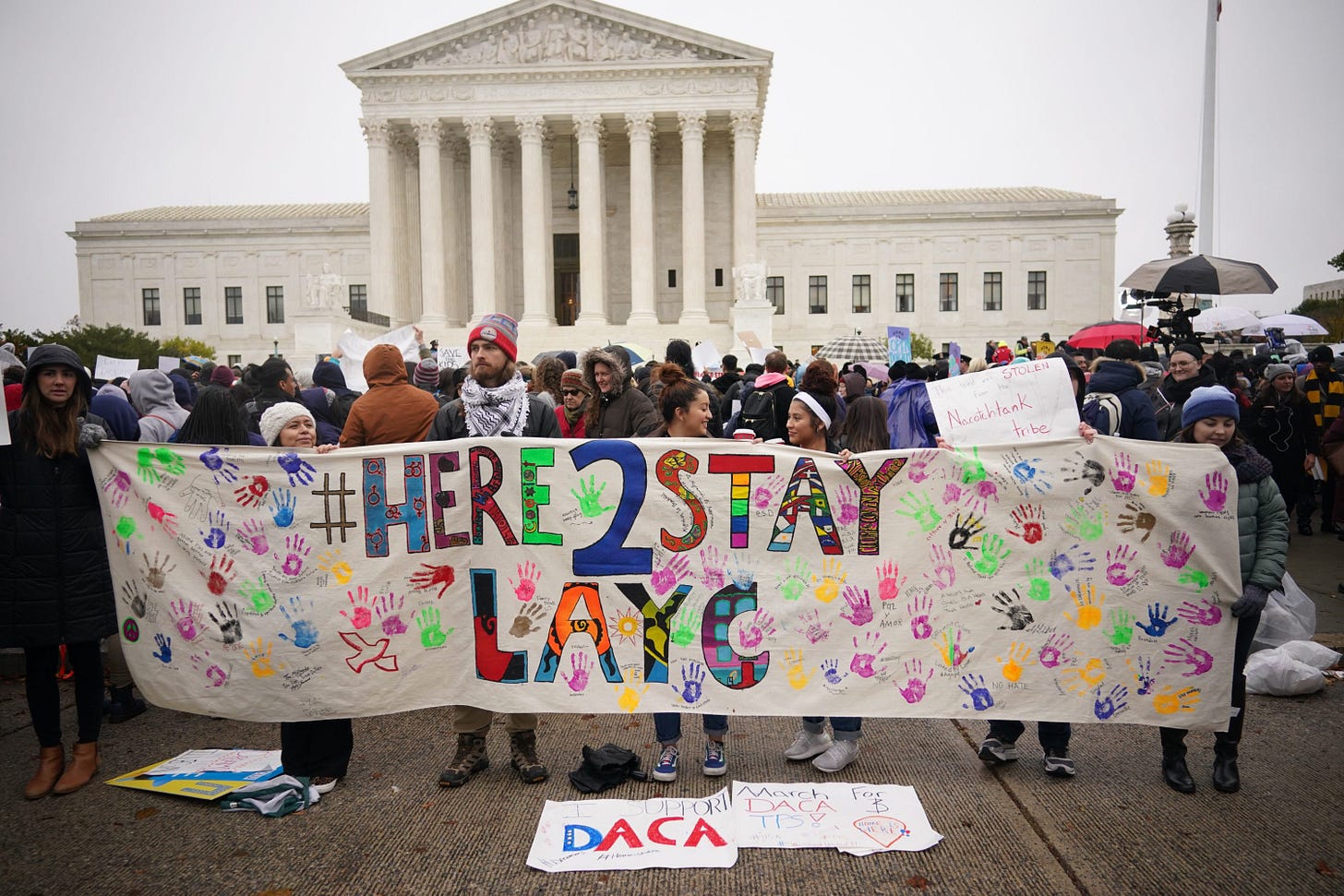America Needs a DACA Deal
It’s the right thing to do for the ‘Dreamers’—and for the economy.

It is coming up on the two-year anniversary of President Trump’s promise to “take the heat” if Congress would reach a bipartisan deal to give legal protections to some 700,000 young people who came to the United States illegally as children. But like most Trump “deals,” this one fell apart as soon as the words were out of his mouth. In the interim, the administration has fought hard to strip all protections from Dreamers, arguing last month before the Supreme Court that the Obama administration’s Deferred Action for Childhood Arrivals (DACA) policy was unconstitutional. Meanwhile, hundreds of thousands of young men and women who grew up and were educated in the United States face a dangerous future in which they could be deported to countries they’ve never known, where they may well become targets of drug cartels and crime syndicates from which their parents fled decades ago to protect them.
Governing is not in the president’s wheelhouse. He would far rather spend his time bingeing on Fox News or out on the campaign trail or on Twitter, whipping up the most xenophobic members of his base. “Many of the people in DACA, no longer very young, are far from ‘angels.’ Some are very tough, hardened criminals,” Trump tweeted hours before the Supreme Court heard the administration’s arguments against DACA. But of course, in order to be eligible for DACA, recipients must have no felony or serious misdemeanor convictions, be in school or employed, and have paid their taxes.
So is there no hope for a Dreamer reprieve by this president? It depends. If he sees it as somehow to his political advantage he might once again shift course. But Democrats would have to be willing to give something in return—and the election year will make bargaining difficult for both sides.
House Democrats passed a Dreamers bill in June, but it was dead on arrival in the Senate and that will not change unless Republicans lose the Senate next year. The Democrats’ bill gave protection not only to childhood arrivals but also to a large group of adults who had received permission to stay in the United States via Temporary Protected Status (TPS) or Deferred Enforced Departure (DED), sometimes decades ago, because of natural disasters or civil unrest in their home countries, putting some 2.5 million people on the path to citizenship. To pass before the election, legislation would have to be a much more modest compromise. And the key may well be something hard for immigrant advocates to swallow—namely, abandoning the right for at least some of the recipients to become citizens.
Such a proposal would be far from ideal—and if it became a permanent part of our immigration laws, it would harm what has been the most successful record of immigrant assimilation in the world. But we are in a crisis, affecting not only the lives of those who face deportation but the communities in which they live and work, indeed the entire U.S. economy. Imagine what would happen if those 2.5 million people who are currently eligible to work legally suddenly could not do so. Employers who continue to employ them would be violating U.S. law, forcing them to seek replacements in a labor market that already lacks available workers for some 7 million jobs. DACA, TPS, and DED workers are people who currently pay taxes, rent or own housing, and buy food, clothing, cars, appliances, and other products that they would no longer be able to afford. If all that disappeared, the economic disruption would be enormous.
So, what might a compromise alternative look like? To have some hope of passing a Republican Senate and get even grudging support from the White House, it would probably not include a direct path to citizenship for individuals in the TPS or DED categories. Under the provisions of the House-passed bill, these workers would have received “green cards” that permitted them to apply for citizenship after five years, but the prospect of millions of new, likely Democratic, voters terrifies Republicans. A more politically tenable compromise could involve creating a new status that would give these individuals renewable, longer work authorization, allowing them to continue their lives here—which opinion polls show is the primary concern of most people who lack full legal status. Democrats might be persuaded to accept these restrictions in return for Dreamer protections that include a full path to citizenship for them and the right to apply for legal status for their parents. But like TPS and DED participants, parents of Dreamers, too, might have to accept a bar to citizenship if a compromise would likely have any hope of succeeding.
There was a time when the two parties could come together to fashion this type of half-a-loaf solution to a difficult problem. Whether the current leadership in either party is ready to do so remains to be seen. But one thing is clear: The clock is ticking and a court decision that strikes down DACA next summer could force both sides’ hands.


